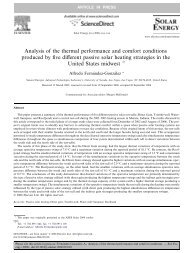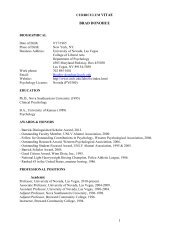2013 Conference Proceedings - University of Nevada, Las Vegas
2013 Conference Proceedings - University of Nevada, Las Vegas
2013 Conference Proceedings - University of Nevada, Las Vegas
- No tags were found...
You also want an ePaper? Increase the reach of your titles
YUMPU automatically turns print PDFs into web optimized ePapers that Google loves.
linked mathematical empowerment with pedagogical empowerment; they described theirnewfound confidence to teach others the mathematics content they felt comfortable. Forexample, one student stated “I know I will be able to teach certain math well because Iunderstand it,” and another said “Since taking this course, I have already begun to help myfriends and younger siblings with their mathematical endeavors. I think that with more practice Iwill be an effective teacher with more than just my stronger subjects.”Although, separated initially, these perspective changes into the categories <strong>of</strong> “Perspectiveson Mathematics” and “Perspectives about Self,” the intertwining <strong>of</strong> their beliefs aboutmathematics, teaching and learning mathematics, and their ability in mathematics form such adynamic relationship that separating statements into these categories felt like a reduction <strong>of</strong> sorts.Therefore, below are participant statements about changes in their viewpoints after participationin this non-traditional mathematics content course.In the beginning <strong>of</strong> [this] class I thought she would be a teacher from the textbooklike every other kind <strong>of</strong> math class I have took in the past. But with [this] class it wasdifferent. She not only took a little from the standard textbook but from her ownways. She makes us think outside the box… This class has opened my eyes to a newmath world, a math world that I will gladly share with my students and colleaguesover the years that will come.During the course <strong>of</strong> this past semester I have learned so much. I was apprehensivetaking what I felt was a lower level math class again. Because I am not good at mathand have never had good math instructors I felt that it would be like every othergeneric math class I have ever taken; the kind <strong>of</strong> class where the teacher stands in thefront <strong>of</strong> the classroom and lectures and teaches only from the book and the examplescome straight from the book and no further. However this class challenges its studentsto think outside the box and to get the answer by thinking in a non-traditional sense.DiscussionThe structure, format and experiences designed as part <strong>of</strong> this non-traditional mathematicscourse served to empower participants both mathematically and pedagogically. The wordempowerment encompasses feelings about capability as well as self-confidence (Ernest, 2002).This course eliminated traditional lecture (focused on procedural reasoning) as a primary source<strong>of</strong> instruction and instead focused on problem-based instruction, student-led solutions, andcollaboration time (Gasser, 2011). This study found that the format <strong>of</strong> class practice affectedstudents in that they reported feeling more confident in their mathematical prowess as well as<strong>Proceedings</strong> <strong>of</strong> the 40 th Annual Meeting <strong>of</strong> the Research Council on Mathematics Learning <strong>2013</strong> 65




